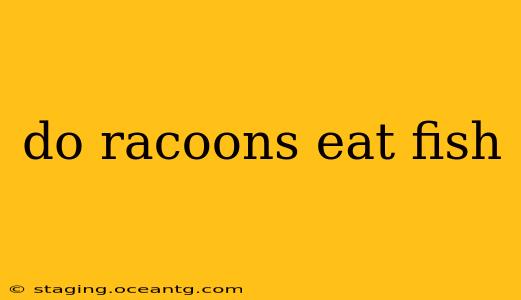Raccoons, those masked bandits of the night, are remarkably adaptable creatures with a diet as diverse as their environment. While often depicted as dumpster-diving scavengers, their culinary preferences are far more complex. So, do raccoons eat fish? The short answer is yes, but it's not the only thing on their menu. Let's delve deeper into their fascinating dietary habits.
What Do Raccoons Eat? A Look at Their Omnivorous Diet
Raccoons are omnivores, meaning they consume both plants and animals. Their diet varies depending on the season and the availability of food sources. Their opportunistic nature allows them to thrive in various habitats, from forests and fields to suburban backyards and even urban centers. A typical raccoon diet includes:
- Insects and invertebrates: Grubs, beetles, caterpillars, and crayfish are all common prey.
- Small mammals: Mice, voles, and even young rabbits can fall victim to a hungry raccoon.
- Birds and their eggs: Raccoons will readily raid nests for eggs and occasionally catch young birds.
- Fruits and berries: Seasonal fruits and berries provide essential nutrients and carbohydrates.
- Nuts and seeds: Acorns, walnuts, and other nuts are a significant part of their fall diet.
- Garbage and human food scraps: Unfortunately, easy access to human refuse leads to conflicts between raccoons and humans.
So, Back to Fish: Do Raccoons Eat Fish?
Yes, raccoons do eat fish. While not a staple food source in all areas, they are opportunistic predators and will readily consume fish when the opportunity presents itself. This is particularly true near water sources where they can easily access fish, especially smaller ones. They might catch fish from streams, ponds, or even steal them from fishing lines!
How Do Raccoons Catch Fish?
Raccoons aren't particularly skilled swimmers, but they are adept at using their nimble paws and sharp claws to snatch fish from shallow water. They might also wait patiently near the water's edge, snatching fish that come close enough. Their intelligence allows them to learn and adapt their fishing techniques.
What Other Foods Do Raccoons Eat Near Water?
Raccoons frequently forage near water sources, not just for fish. Their diet near water bodies is often enriched with:
- Crayfish: These crustaceans are a favorite and readily available in many aquatic environments.
- Frogs and tadpoles: Another common aquatic prey.
- Aquatic plants: Some aquatic plants form part of their diet, providing additional nutrients.
- Waterfowl eggs: Raccoons will readily raid nests of waterfowl near water sources.
Are Raccoons Harmful to Fish Populations?
The impact of raccoons on fish populations is complex and depends largely on the density of raccoon populations and the size and health of the fish population. In areas with high raccoon densities and relatively small or vulnerable fish populations, their predation can have a noticeable effect. However, in most cases, their impact is minimal, and they represent just one component of a complex ecosystem.
What Attracts Raccoons to Your Property?
Understanding what attracts raccoons can help prevent conflicts. Common attractants include:
- Unsecured garbage cans: Properly storing garbage is crucial in deterring raccoons.
- Pet food left outdoors: Keeping pet food indoors prevents raccoons from becoming a regular visitor.
- Water sources: Repairing leaky faucets and keeping bird baths clean reduces the attraction of water sources.
- Fruit trees and gardens: Harvesting ripe fruits promptly can minimize attraction.
By understanding the diverse dietary habits of raccoons and addressing the factors that attract them, we can better coexist with these fascinating animals. Their adaptability and omnivorous nature allow them to thrive in a variety of environments, but their opportunistic feeding habits can sometimes lead to conflicts with humans. Responsible management of our environment and food waste is crucial in minimizing these conflicts.
